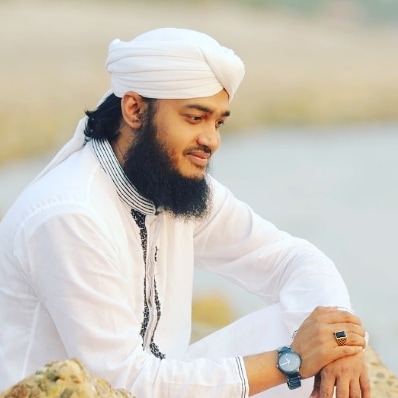About me

Sayed Mokarram Bari is an Islamic speaker & motivational writer (Alhamdulillah) in Bangladesh.
Sayed Mokarram Bari son of Mufti Sayed Shamshudduha Bari and he was born Chittagong on 1st January 1992 and he grew up in a birthplace. He studies at al Amin Baria Kamil Madrasha, Subhania Alia Madrasha and Chittagong National University In Economics. Sayed Mokarram Bari is a Founder member of Inter Human Relationship.
Sayed Mokarram Bari has more than 1.6 Lakh followers (Alhamdulillah)) on his Facebook. He believes Islam means submission to Allah (God).
The word Islam means “entering into a condition of peace and security with God, through allegiance or surrender to him”.
Islam is a constituent part of life. It tells us how to manage all activities of life in a sound and ethical way. Everyone can easily understand the Quran and follow the footsteps of the Prophet Muhammad (SAW), to the best of his or her ability. Allah assured that He will accept the deeds that each soul has the ability to offer:
“On no soul does Allah place a burden greater than it can bear.” (Quran 2:286)
Islam established a clear system of worship, laws about how to live life, civil rights, political rights, social issues and rights, laws of marriage and divorce, inheritance rights and all others which we deal with our daily life routine. It is not in the mosque only; it is for daily life, a guide to life in all its aspects. As we know Islam is a guide to life in all its aspects so it keeps away a Muslim from the confusion of any type because Islam is logical and rational.
Islam conducts a Muslim’s life in all its aspects. That’s why it is not only a religion, but also a way of life. It surely states that righteous conduct must be followed by belief in Allah. The Quran says:
“For those who believe and work deeds of righteousness is a reward that will never (fail).” (Quran 41:8)
The lines mentioned below explain some examples of Islam being a complete Islamic code of life by showing the instructions related to different areas of life.
- How to behave with Non-Muslims: Those who don’t accept Islam and we can say those who are nonbelievers are called Non-Muslims. Allah (SWT) teaches Muslims to treat them kindly and respectfully. Let these people believe what they don’t want to be rude to them. Those who are rude and offensive are disliked by Allah.
- About Forgiveness: Allah loves those who forgive others mistakes. He asked people to forgive others if they want to be loved by Allah Almighty. We have so many examples of forgiveness from the life of Prophet Muhammad (SAW), He (SAW) always forgave his enemies.
- About Justice with Others: Justice is an important principle of life because when injustice overrule, corruption is the result which can vanish everything. Allah (SWT) advised Muslims to do justice correctly in all aspects of life.
- For Spiritual Life: Islamic code of life tells us about Salah, Fasting, Zakat, Pilgrimage, love for Allah and His Messenger, love for truth and humanity for the sake of Allah, trust in Allah at all times and doing well for the sake of Allah. Islam provides us guidance about all these things and also many others which not mentioned here.
- Family Life: Family is a human social group whose members are bound together by the bond of blood ties and/or marital relationship and nothing else. Marriage is a religious duty of all who are capable of meeting its responsibilities. Each member of the family has rights and obligations. The Islamic code of life teaches us about the fulfilment of their rights and we should fulfil all rights respecting to each individual.
- Honest Dealing in Trading: Allah Almighty says in the Quran:
“O you who believe! Stand out firmly for Allah, as witnesses to fair dealing, and let not the hatred of others to you, make you swerve to wrong and depart from justice. Be just: and fear Allah. For Allah is well-acquainted with all that you do.” (Quran 5:8)
From above verse, we can conclude that Allah teaches us about doing Justice in all aspects of life whether its business or any other thing. We should be careful while doing trading, buying and selling in our daily life so that we are not doing unjust with anyone.
Origins of Islam
Islam means submission to Allah (God).
The word Islam means “entering into a condition of peace and security with God, through allegiance or surrender to him”.
Islam was revealed to the Prophet Muhammad who lived from 570 CE to 632 CE in Mecca in modern-day Saudi Arabia. Muhammad was called to prophethood when God dictated the Quran to him through the archangel Gabriel. Although he gained a small following in his tribe, Muhammad was initially persecuted for his beliefs. In 622 CE he fled to Yathrib, now called Medina, where the first Muslim political community was formed. Enlisting the help of nomadic Arab clans, Muhammad returned to Mecca, stripping the city of all signs of pagan belief. He was generous to those he defeated, however, and many converted to Islam. Two years later, in front of the Ka’ba in Mecca, he declared Islam the religion of the people, saying he had fulfilled his mission and that he left behind him the Book of Allah and a set of clear commandments.
Muhammad (or Mohammed), A.D. 570-632, is the founder of the world religion of Islam and is regarded by Muslims as the messenger and prophet of God (Allāh), the last and the greatest in a series of prophets of Islam. Muslims consider him the restorer of the original, uncorrupted monotheistic faith (Islam) of Adam, Abraham and others. The name Muhammad literally means “Praiseworthy”.
Born in 570 CE in the Arabian city of Mecca, he was orphaned at a young age and was brought up by his uncle. He later worked mostly as a merchant. Discontented with life in Mecca, he retreated to a cave in the surrounding mountains for meditation and reflection. According to Islamic beliefs it was here, at age 40, in the month of Ramadan, where he received his first revelation from God. Three years after this event Muhammad started preaching these revelations publicly, proclaiming that “God is One”, that complete “surrender” to Him is the only way acceptable to God, and that he was a prophet and messenger of God, in the same vein as Adam, Noah, Abraham, Moses, David, Jesus, and other prophets.
Muhammad gained few followers early on and migrated to Medina in the year 622. This historic event, the Hijra, marks the beginning of the Islamic calendar. The revelations (or Ayats, lit. “Signs of God”), which Muhammad reported receiving until his death, form the verses of the Quran, regarded by Muslims as the “word of God”, around which his religion is based. Besides the Quran, Muhammad’s life (sira) and traditions (sunnah) are also upheld by Muslims.
At the end of the tenth year after the migration to Medina, Muhammad carried through his first truly Islamic pilgrimage. In 632 a few months after returning to Medina from his Farewell pilgrimage, Muhammad fell ill and died.
Quran (Koran) is the source of all certainty. It is a a later revelation, superseding and correcting errors in the Bible. Muhammad received the Quran as a copy of the eternal Quran which is inscribed in heaven.
History and Spread of Islam By the time of Muhammad’s death, many people of the Arabian Peninsula had begun to follow Islam. A series of caliphs and dynasties led the Muslim community after Muhammad’s death, creating an Islamic empire that expanded as far as modern-day Pakistan in the east, Spain in the north, and North Africa to the south. This was a period of great intellectual, cultural and spiritual vitality. In Spain, Islamic civilization lasted until 1492 when the Christian monarchs regained power. After the collapse of the Empire, Islam remained the dominant religion in most Middle Eastern countries and significant pockets throughout North Africa and Asia. |
